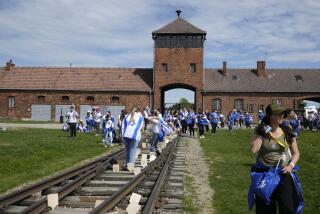Riot Police Try to Crush Prague Memorial Rally
- Share via
PRAGUE, Czechoslovakia — Riot police attacked thousands of demonstrators with batons, tear gas and water cannon on Sunday, attempting to crush a rally held to commemorate the death of Jan Palach, who burned himself alive 20 years ago to protest the Soviet-led invasion of Czechoslovakia.
But after helmeted police with truncheons and Alsatian dogs charged into Prague’s Wenceslas Square, where the ceremony was to be held, more than 4,000 regrouped and marched through the city center shouting “Freedom, freedom,” “Long live democracy” and “Truth will prevail.”
The violence erupted just an hour after Czechoslovakia became one of 35 nations agreeing to a landmark human rights accord at a conference held in Vienna to review the 1975 Helsinki Accords.
Most of central Prague was cordoned off by police. Armored personnel carriers rumbled through the capital, tear gas was sprayed into a subway station where protesters had fled and witnesses said a West German television crew was beaten.
More than a dozen people were dragged away by police at Wenceslas Square and several were left limping, including one who required ambulance service. Side-street marches went on into the evening.
Philosophy Student
Palach, a 20-year-old philosophy student, burned himself to death in the central square on Jan. 16, 1969, to protest the 1968 invasion.
The Charter 77 human rights movement and four independent groups sought to go ahead with the memorial ceremony despite an official ban and anonymous warnings that a student imitating Palach was to set himself ablaze in the square on Sunday.
Charter activists appealed against suicide as a political protest but declined to rule out the possibility that the warnings were police forgeries designed to discredit the movement and justify blocking the ceremony.
The official news agency CTK said 91 people were detained and described the planned gathering as a provocation prepared by “anti-state elements.”
“In spite of the ban by state authorities, they tried to misuse the anniversary of the senseless suicide of student Jan Palach to incite anti-socialist emotions and disturb order in the capital,” CTK said.
‘Long Live Havel’
Among those arrested were Charter 77 activist Ladislav Lis. The prominent charter co-founder Vaclav Havel, denounced in the official press this week for “playing the role of an oppressed fool,” was also in the crowd, which chanted “Long live Havel.”
Several thousand people prevented by police from entering Wenceslas Square assembled in the Square of the Red Army and attempted to march into the Old Town Square, but police had sealed that off as well.
A separate group of about 2,000 later marched through the narrow streets of Prague’s medieval center before being beaten back by riot police with water cannon.
Police began charging at about 1,000 people who surged towards the statue of St. Wenceslas in the main square where Palach staged his suicide.
Hundreds fled amid cries of “Gestapo!” as police struck out with their batons. About 800 regrouped in the square to sing the national anthem before police charged again.
Scene of Past Demonstrations
The use of water cannon and over 20 police trucks forced thousands of others out of the far end of the square, scene of several violently curtailed demonstrations over the last five months.
Communist authorities allowed a peaceful rally outside the downtown area on Dec. 10, the first officially approved independent demonstration in 20 years.
But the authorities later denounced it as confrontational. Dissidents attributed the original approval to the fact that French President Francois Mitterrand had just visited Prague and spoken out on human rights.
Charter 77 and other independent groups plan a pilgrimage on Saturday to Vsetaty, the village where Palach was born, although local officials have warned them against the action.
Palach’s death stunned the nation. Lighted candles covering his former burial site in Prague’s Olsany Cemetery show he remains a potent symbol of self-sacrifice and desperate protest against the Soviet tanks and hard-line Czechoslovak Communists who dismantled the brief-lived “Prague Spring” liberalization efforts of 1968.
The words “We Will Remain Faithful,” painted across the back of an adjacent tombstone, had been recently covered over. Plainclothes officers keep a close watch on those paying homage at the grave.
“My peers did not forget,” said a young man standing beside his weeping mother as she placed flowers on the empty grave.
When the grave became a focal point for protests in 1972, police dug up Palach’s remains and moved them to Vsetaty.
More to Read
Sign up for Essential California
The most important California stories and recommendations in your inbox every morning.
You may occasionally receive promotional content from the Los Angeles Times.













